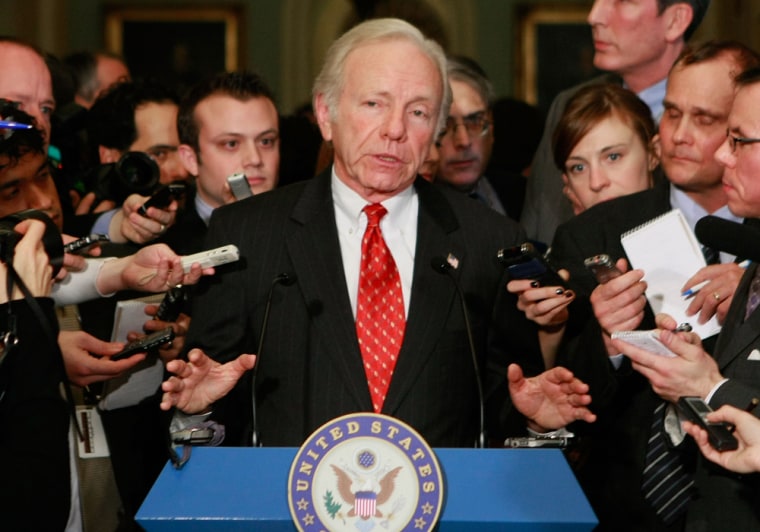In a closed-door meeting that lasted nearly two hours, Senate Democrats decided, by a secret ballot Tuesday, to keep Sen. Joe Lieberman, the independent from Connecticut who’d harshly criticized Barack Obama during the campaign.
The Democrats passed a resolution to let Lieberman remain chairman of the Homeland Security Committee.
In turn, he decided he’d continue to caucus with the Democrats rather than walking out and joining the Republicans.
The Democrats kept Lieberman in the fold because politics is a game of addition, and the magic number, plus or minus one or two, is 60: the number of senators needed to defeat a delaying motion or filibuster. The number is imprecise because a few Republicans might join with Democrats efforts to end a GOP filibuster and on some votes a few Democrats might defect.
With Senate races still to be decided in Minnesota and Georgia, the Democrats are only three away from getting their 60. A Lieberman exit would make that goal impossible.
With Lieberman joining the Democrats on most roll call votes, Republicans will have a very difficult time stopping the president-elect's legislative agenda.
Magnanimity in victory
The peacemaking Tuesday illustrates the Churchill adage: “in defeat, defiance; in victory, magnanimity.”
And Sen. Ben Cardin, D-Md., told reporters after the closed-door meeting that once Obama magnanimously said he felt comfortable with Lieberman staying in the Democratic ranks, Senate Democrats acceded to his wishes.
“There is something different about this guy, Barack Obama,” said Cardin. “He really wants things done differently in Washington. It’s not about partisan politics. Partisan politics is over.”
Whether partisan politics really is “over” will be seen in the months ahead, but a filibuster-proof majority would make it harder for Senate Republicans to have any effect. In that sense, partisan politics may be moot on some issues.
“It went well,” Lieberman said casually as he walked out of the closed-door meeting in the old Senate chamber in the Capitol. “It was a very positive discussion, and I appreciate very much that the resolution passed. And I look forward to continuing my work on Homeland Security. I’m very happy.”
Thirteen voted against Lieberman
Not happy will the be the 13 Democratic senators who voted to strip Lieberman of his chairmanship and those progressive activists around the nation who have despised Lieberman ever since his attacks in 2003 and 2004 on his rival for the Democratic presidential nomination, Howard Dean.
At one point in that 2004 campaign Lieberman seemed to question whether Dean had the stability to be president.
Anti-Lieberman forces rallied behind Ned Lamont, who beat him in the 2006 Democratic Senate primary.
But Lieberman, defiant in defeat, ran as an independent and easily won the general election. His term ends in 2013.
Talking to reporters after Tuesday’s meeting, Cardin emphasized Lieberman’s “total record — one of a progressive (state) attorney general, a progressive state legislator, a progressive senator.” He praised Lieberman’s “record on civil rights, his record on the environment, his record on consumer issues.”
Cardin added, “Obviously he did things in this campaign that none of us understand and none of us are prepared to forgive, but we need to move forward. There are things he said during the campaign that I can not overlook. There were things that I will never understand. And I know Joe Lieberman well and I respect Joe Lieberman. But on those issues you can’t just say, ‘it’s over.’”
Yet Cardin insisted the spirit of reconciliation had to prevail.
'Apology' too strong a word
Sen. Mary Landrieu, D-La., said that during the presidential campaign, Obama and other Democrats “talked about a message of unity. Today was living that message of unity as we welcomed Sen. Lieberman’s comments — 'apology' may be too strong a word — but his acknowledgment that he had strained the relationship and the affections of the caucus.”
Politics at the grassroots is a matter of passionate commitment that makes people give up their nights and weekends to do door-to-door canvassing and phone banking. Some of the Democratic partisans passionately wanted Lieberman booted from the caucus.
But in the Capitol, politics is a matter of personal friendships and grudges among senators, who in some cases have known each other for more than 20 years. A private club operates differently than a precinct caucus.
A club member can violate etiquette or break the rules, and Lieberman had done that. But it was in his interest and that of his fellow members to remain in the club.
Before it is forgotten, what had Lieberman said that was so offensive to Democrats?
Among other things, he had impugned one of the very things that Democrats were celebrating Tuesday: Obama’s ability to unify and bridge partisan divides.
At the Republican convention in St. Paul last September, Lieberman told a national TV audience that, as a senator, Obama “has not reached across party lines to accomplish anything significant, nor has he been willing to take on powerful interest groups in the Democratic Party to get something done.”
That seemed ancient history Tuesday.
It is those same “powerful interest groups in the Democratic Party” who will have president-elect Obama leading them to enact a policy agenda. And on some of the votes, Republicans and Lieberman will be voting “yes.”
